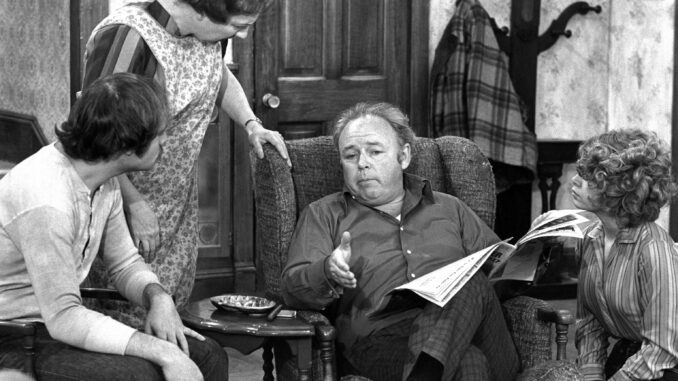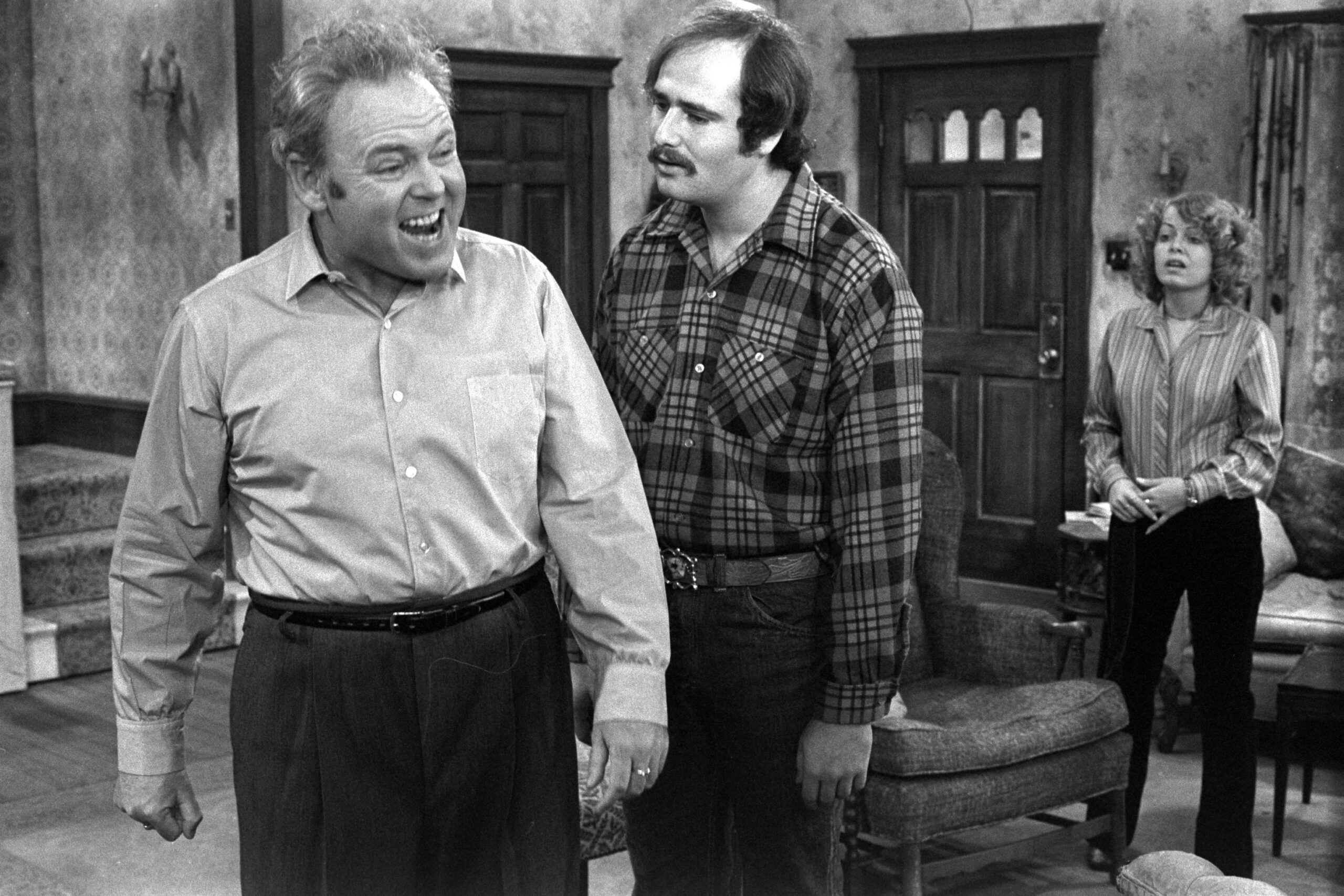
When All in the Family premiered on CBS in January 1971, American television changed forever. Up until that moment, sitcoms were safe, predictable, and often disconnected from reality. They were comfort food for the masses—shows about perfect families living perfect suburban lives. Then came Archie Bunker.
Loud, opinionated, and unapologetically bigoted, Archie was everything America wasn’t used to seeing on TV. He insulted minorities, mocked women, and clung to outdated ideas with a stubbornness that could drive anyone crazy. But here’s the twist—people loved him.
So how did a foulmouthed bigot become one of America’s most beloved characters? And more importantly, how did he change the way we see ourselves?
Norman Lear’s Genius: Holding Up a Mirror to America
The mastermind behind All in the Family, Norman Lear, didn’t set out to make people comfortable. He wanted to make them think. Lear believed television could be more than escapism—it could be a mirror reflecting society’s flaws, fears, and contradictions.
Lear based the show on the British sitcom Till Death Us Do Part, but he gave it an American soul. Archie Bunker, played by Carroll O’Connor, wasn’t just a character; he was the embodiment of a country caught between the past and the future.
Meet Archie Bunker: The Flawed Everyman
Archie was a blue-collar worker from Queens, New York—a man who believed in hard work, family, and “the good old days.” But those “good old days” were a world where everyone knew their place—a world that was disappearing fast.
Archie feared that change. He didn’t understand feminism, civil rights, or the counterculture movement. His frustration came out as ignorance and prejudice, but beneath the bluster was something familiar: fear of being left behind.
The Family That Challenged Him—and Loved Him Anyway
At the heart of All in the Family was conflict—between generations, values, and ideals. Archie’s daughter, Gloria (Sally Struthers), and her husband, Mike “Meathead” Stivic (Rob Reiner), represented the liberal youth of the 1970s.
Their constant debates with Archie became the show’s trademark. Edith (Jean Stapleton), Archie’s sweet, gentle wife, served as the emotional glue—loving him despite his faults and often grounding his fiery temper with kindness and humor.
This dynamic wasn’t just entertaining—it was revolutionary.
The Power of Controversy

In its very first episode, All in the Family featured language and topics that had never been heard on American television. Words like “spade,” “queer,” and “Polack” shocked audiences. Some viewers were outraged. Others laughed nervously. But everyone talked about it.
And that was exactly what Norman Lear wanted. By making people laugh at Archie’s ignorance, the show invited them to question their own biases. Archie said the things people whispered in private—and in doing so, he forced America to confront itself.
Laughter as a Weapon Against Prejudice
Here’s the genius of Archie Bunker: he made bigotry ridiculous. His rants were so absurd, so over-the-top, that they exposed the stupidity of prejudice.
For many viewers, laughing at Archie became a form of release—a way to process the uncomfortable truths about society. The show proved that humor could be more powerful than outrage in changing hearts and minds.
America’s Reaction: Outrage Meets Obsession
When All in the Family first aired, CBS was flooded with complaints. Some people thought the show was too offensive. Others thought it was too liberal. Yet, despite (or maybe because of) the controversy, ratings skyrocketed.
By its second season, All in the Family was the number-one show in America—a title it held for five straight years. Archie Bunker had become both hero and villain, loved and loathed in equal measure.
Carroll O’Connor: The Man Behind the Mouth
Carroll O’Connor was nothing like Archie Bunker in real life. A thoughtful, well-educated actor, he infused the role with humanity and depth. He once said that Archie wasn’t evil—just “terribly misinformed.”
O’Connor’s performance kept Archie from becoming a caricature. You couldn’t fully hate him because, at times, you understood him. That’s what made the character unforgettable.
Breaking the Mold: A Sitcom with Substance
Before All in the Family, sitcoms avoided hot topics. After it, everything changed. Norman Lear proved that TV could tackle politics, race, religion, and class while still being funny.
The show paved the way for socially conscious sitcoms like Maude, The Jeffersons, and Good Times. These series continued Lear’s mission—to make America laugh, think, and evolve.
Archie’s Transformation: From Bigot to Human
What made All in the Family truly remarkable was Archie’s slow evolution. He never became a saint, but he grew. Through interactions with his family, neighbors, and coworkers, we saw flashes of vulnerability and compassion.
When Edith died in the spin-off Archie Bunker’s Place, audiences wept. By then, Archie was no longer just a symbol of intolerance—he was a man who had learned, in his own clumsy way, to love people he once feared.
Why America Needed Archie Bunker
Archie worked because he was real. He reminded America that prejudice isn’t limited to villains—it can live in the people we love. The show made it safe to talk about things most people avoided: racism, sexism, homophobia, classism.
By turning hate into humor, Lear gave the nation a mirror—and permission to change.
Iconic Episodes That Defined the Series
“Sammy’s Visit”
When Sammy Davis Jr. appeared as a guest and kissed Archie on the cheek, it became one of TV’s most talked-about moments—a cultural mic drop.
“Edith’s 50th Birthday”
A harrowing episode where Edith narrowly escapes assault showed that sitcoms could handle serious subjects with grace and emotion.
“Archie Is Branded”
When Archie discovers he’s unknowingly associated with a hate group, the irony is both heartbreaking and hilarious—a perfect example of Lear’s balancing act.
Archie’s America vs. Ours
Watching All in the Family today feels like peering into a time capsule. But in many ways, it still resonates. The arguments over politics, identity, and progress haven’t gone away—they’ve just changed shape.
If Archie Bunker were alive today, he’d probably have strong opinions about social media, cancel culture, and immigration. And once again, we’d find ourselves laughing, cringing, and debating around the dinner table.
The Legacy of “All in the Family”
The show won 22 Emmy Awards, influenced countless writers and comedians, and is consistently ranked among the greatest TV series of all time. But its real legacy lies in conversation.
It made America look inward. It made people ask uncomfortable questions. And it proved that comedy, when done right, can be one of the most powerful tools for social change.
What Made Archie Bunker Endearing
Despite his flaws, Archie had heart. He worked hard, loved his family, and—beneath the gruffness—wanted to do right. Audiences forgave his ignorance because they saw sincerity behind it.
That combination of honesty and humor made him impossible to forget. He was offensive, yes—but also authentic. And authenticity never goes out of style.
Conclusion: The Bigot Who Made America Better
Archie Bunker wasn’t just a character—he was a phenomenon. He forced America to laugh at its prejudices and, in doing so, begin to heal them.
Norman Lear and Carroll O’Connor gave us a gift: a reminder that change starts not with silence, but with conversation. Archie might have been wrong about a lot of things, but he was right about one—family, in all its messy imperfection, is worth fighting for.
And maybe, just maybe, laughter really can make the world a little better.
